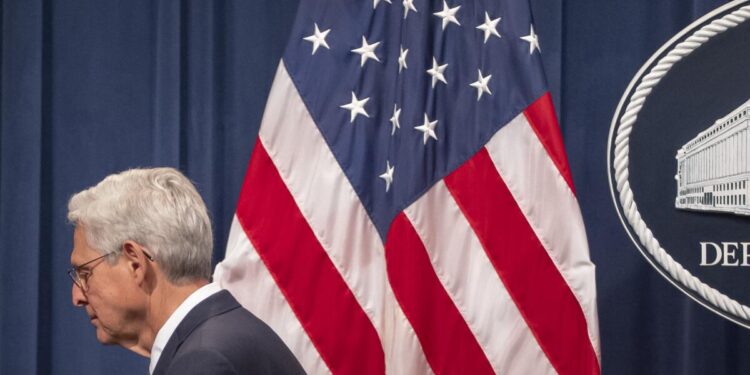Back in 2016, the American Bar Association couldn’t have praised Merrick Garland enough. At the time, he was the chief judge of the influential U.S. Court of Appeals for the District of Columbia and President Obama’s pick for the Supreme Court. When the ABA sent its report to the Senate, they awarded Garland their highest rating. During his confirmation hearing, a bar official shared glowing testimonials from hundreds of lawyers, judges, and law professors who had been consulted.
One anonymous admirer even claimed, “He may be the perfect human being.” Another boldly stated, “Judge Garland has no weaknesses.”
This sets the stage for the unfortunate saga of Merrick Garland. He was a man who had all the makings of a remarkable Supreme Court Justice, but due to then-Senate Majority Leader Mitch McConnell’s unprecedented block, instead became what some see as an ineffective attorney general. During his tenure, he faced the monumental task of holding Donald Trump accountable for attempts to undermine the 2020 presidential election.
Ironically, the very qualities the ABA had praised in Garland—his cautious deliberation, humility, judicial demeanor, and disregard for politics—seemed to hinder him as head of the Justice Department.
Garland was focused on restoring the department’s independence and integrity. This came after Trump’s first term, during which he was accused of trying to use the department against his adversaries. Garland initially steered clear of prosecuting Trump for his actions following the election, wary of how it might appear—a partisan move against the man President Biden had recently defeated.
Nevertheless, Trump, true to his style, preemptively accused Garland of what Trump himself was perceived to have done: politicizing the Justice Department. Yet, in a nation rooted in the rule of law, pursuing the case against Trump was essential.
Garland did manage to reinstate post-Watergate protocols, limiting interactions between law enforcement and the White House. Interestingly, Garland had contributed to establishing these norms as a young lawyer in the Carter administration, in reaction to Nixon-era infractions. But Trump, having been shielded by the election from facing consequences for January 6 or the separate charges of mishandling classified documents, seems poised to regain power, now with a backing more audacious and eager to fulfill his objectives at the Justice Department and FBI.
Last week did see minor wins for justice, though not necessarily linked to Trump’s alleged federal offenses. On Friday, he was sentenced in New York state for falsifying business records related to hush-money payments during the 2016 election. Although Judge Juan M. Merchan imposed no penalty, the sentencing did enforce Trump’s status as the only felonious president. Additionally, Garland suggested he would publicize Special Counsel Jack Smith’s comprehensive report detailing Trump’s alleged wrongdoings on January 6.
As the 72-year-old attorney general prepares to step down, he leaves behind mixed reactions—Republicans criticized him for pursuing Trump, while Democrats felt he hadn’t acted swiftly or decisively enough. California Senator Adam B. Schiff, who had been on the House January 6 committee, was among the first Democrats to partly blame the Justice Department for not advancing Trump’s trial before the 2024 election. On CNN, he argued the department had overly focused on the attackers from the Capitol riot, rather than those who incited the events.
CNN’s retrospective on prosecuting Trump called 2021 “the lost year.” Even as the former president was still dealing with fallout from January 6, the Justice Department pursued a bottom-up strategy, targeting more than 1,500 rioters in its largest ever criminal probe. Prosecutors insisted they were following leads involving Trump and those close to him, while grappling with the legal complexities of potentially trying a former president.
By 2022, questions regarding Garland’s perceived delays were inevitable. In March, U.S. District Judge David O. Carter concluded in a civil case that “the illegality of the [fake electors] plan was obvious.” By April, the FBI had launched a criminal investigation into the scheme. Then, in June, the House January 6 committee’s public hearings served as a gripping exposé on Trump’s various attempts to retain power, featuring testimony from Republican witnesses.
Finally, these developments prompted Garland to shift focus to the man at the top. In November 2022, he designated Jack Smith as special counsel. Even with Smith’s apparent expediency, it wasn’t until August 2023—over two years after the insurrection—that Trump faced criminal charges. The subsequent legal back-and-forth, including a controversial claim for presidential immunity, only further postponed proceedings.
Blaming Garland solely for leniency towards Trump overlooks the roles of others equally deserving of criticism. McConnell, for example, facilitated Trump’s Senate acquittal in February 2021 post-impeachment; a conviction might have barred Trump from holding federal office again. Then there’s the Supreme Court’s conservative majority, which spent seven months wrestling with Trump’s assertion of immunity for supposed official acts.
Even if Garland had acted more aggressively, there’s a strong case that Trump’s ability to exploit delay tactics would still have thwarted a pre-election trial. Yet, critical insight was readily available for voters to deem Trump unsuitable for presidency again. A plurality thought otherwise.
Reflecting on Garland’s journey evokes a bittersweet sentiment, thinking that his talents might have been better suited for the Supreme Court, rather than the Justice Department.
















